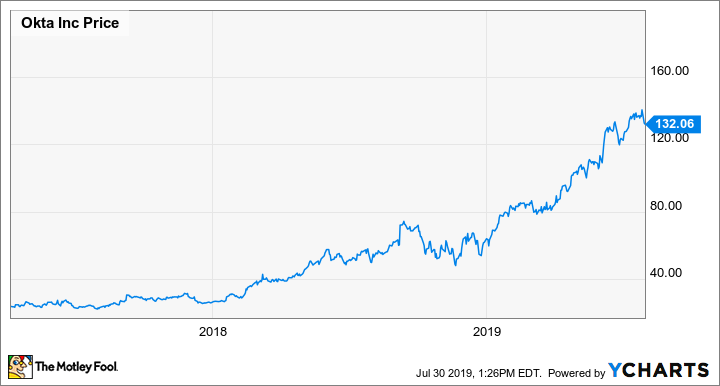Okta (OKTA -0.10%) is a cybersecurity platform that helps companies verify the identity of employees, contractors, and customers. Cybersecurity has been a hot-button issue in tech over the past decade, and Okta is approaching the problem from a new angle, solving it for a rapidly growing customer base.
The company's stock price has been on a tear since it went public in 2017. Okta debuted at $17 per share in its IPO, and just two years later, the stock trades at a price exceeding $130 -- that's more than seven times the IPO price!
Will the stock's momentum continue? Signs point to yes.
The identity cloud
Most cybersecurity companies focus on creating a firewall between a network and the outside world. However, in a cloud computing world in which people are on the go and use multiple devices and connections to access a network, firewalls have become increasingly difficult to administer.
Okta has taken a different approach, which it refers to as identity management. In Okta's security paradigm, identity is the key to trusting users. According to the company, 81% of cybersecurity breaches can be traced back to stolen or weak user credentials.
The company's identity management product works by enabling people to securely access a network via a multifactor verification and sign-in process. This sign-in method can effectively stop most unauthorized log-in attempts. Once logged in through Okta's verification gateway, a user can access the applications and resources they have been granted access to. This includes network folders, cloud-based applications, communications tools, and more.
Okta refers to its flagship platform for identity management as the "identity cloud" because it enables users to log in from anywhere using any device to seamlessly and securely access the resources they need. The company's largest source of revenue today is enabling an organization's employees and contractors to securely access company resources, but Okta has also enabled businesses to use the identity cloud to verify customers.
The solution to significantly reduce incidents of cybersecurity breaches through better identity verification is both simple and powerful. Okta's platform provides an effective solution that has the promise to save organizations a lot of money in fraud prevention. Based on the company's reported growth figures, customers appear to see the value in Okta's solutions.

Image Source: Getty Images.
Executing on growth
Like with many other recent initial public offerings, Okta's investors are primarily betting on sales growth. The company has laid out a growth strategy that involves signing up new customers, expanding relationships with existing customers, and growing internationally. So far, the growth strategy appears to be working.
On Okta's Q1 2020 earnings call, management highlighted overall revenue growth of 50% compared to the prior year. This rapid sales growth was driven by the addition of large new customers. Okta saw 53% growth in customers with annual revenue greater than $100,000. Another eye-popping stat was international revenue growth of 60% in the first quarter.
How is Okta attracting new customers? The company has a salesforce that targets potential large customers, but additional sales support comes from channel partners. Channel partners are companies that Okta works with to service customers and can include other applications that run on Okta or consulting firms that advise clients on cybersecurity solutions and systems integration. Channel partners are very effective in selling to customers that may be too small for Okta's salesforce to target or are off the company's radar.
The other pillar of Okta's growth strategy is what is referred to as a "land and expand" strategy in which the company lands a small sale at a large organization and can grow its revenue at the customer by increasing the scope of services offered. One metric the company cites is its dollar-based net retention rate. This measures the growth in existing customer spending net of lost customers. For the last 12 months, Okta has had a dollar-based net retention rate of 119%, which shows that on average, spending from existing customers is robust.
The growth stats paint an optimistic picture for Okta. The company is executing a balanced strategy of adding new customers, growing spending from existing customers, and gaining sales traction internationally. Not only is Okta proving to be effective at sales, but its product is clearly keeping its customers satisfied.
A bright future
Okta has had a strong start out of the IPO gates. Just two years in, its stock has proven to be a good investment for everyone who bought and didn't sell. The strong stock performance can be traced back to strong execution on both the product and marketing sides. Okta's identity cloud is an elegant solution to a very costly problem for organizations moving to the cloud. At the same time, the company has organized its growth efforts such that it is able to deliver results from multiple sales channels.
In the grand scheme of things, Okta is still relatively early in transforming the way cybersecurity is managed. Signs point to more growth ahead -- and a higher stock price along with it.






